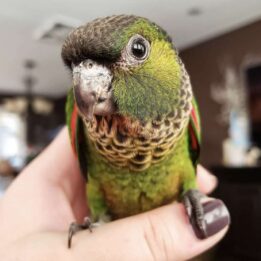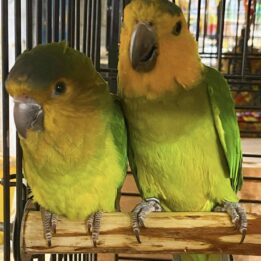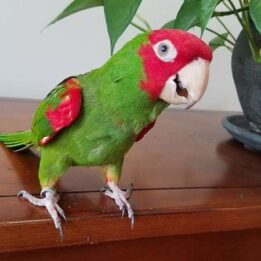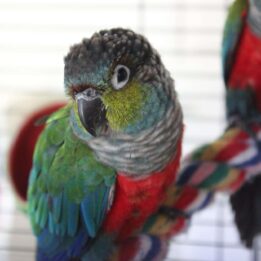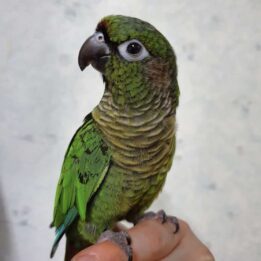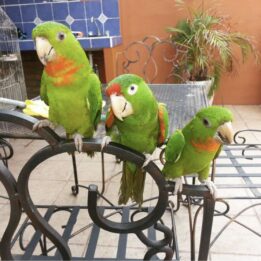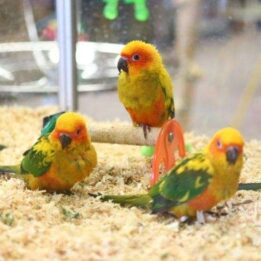The Conures parrot is a remarkable bird. They are popular because of their beauty, as well as their intelligence. They are often full of playful antics and they enjoy sharing their play. They are quite peaceful but will readily engage in play with human companions, other birds, and sometimes even other pets.
Besides being very social and quite active, conures are easily tamed. These little parrots love to learn tricks. Most conures can learn a few words though their voices are high pitched. Consequently what they are saying is often unclear. They are hardy birds that rarely get sick.
Both male conures and female conures make equally good pets. A conure parrot that is kept singly will tame quickly and will soon learn new tricks. They like affection and they also like to preen and be preened. You’ll find that a conure parrot will just enjoy your company in general.
Their coloring is truly exquisite; you will find shades of gray, white, red and orange mixed with their basic green, depending on what part of the Latin American countries they are raised. They run in a length of approximately twelve and a half inches.
Temperament
The Conures thrive on friendship and companionship. They tame very quickly and in no time you can expect your particular species of Conure to be clamoring to be let out of his/her cage, sit on your hand and shoulder, pull toys and imitate sounds. Some Conures can be nippy, especially with people they don’t know, but a little careful training can rid most of the problem.
Conure As A Pet
Conures are charming, enchanting and beautiful birds. These birds are famous for their amusing nature and liveliness. Special attention should be given to a pet Conure’s hygiene and care, especially to its nails and beaks. They also require a good amount of exercise and activities so that they don’t get bored. Conures love taking baths – it also keeps their feathers sleek and shiny.
Training Conures is a challenging job. Expert training is a fundamental phase of owning Conures. It requires great dexterity and patience. Repeated praising and treats would make them adapt to the training easily.
Special Characteristics
Conures are noisy birds. Almost all have loud voices and like to use them.
They aren’t notable talkers, but almost all will speak a word or two. Some species are better than others, but it mostly depends on the individual.
They are active, playful, bold, and affectionate.
They have remarkable mood swings but in a good way. One minute they’ll be acting the clown, climbing on their toys and screeching in mock anger, the next minute they’ll be curled next to you, begging for a scratch.
Conures beg for attention all the time.
They’re great at learning tricks; many will lie on their back and “play dead”, and hanging upside-down from a finger is an easy one.
Some Conures are one-person birds, others more out-going.
Diet
A Conure should be provided with a proper diet to keep it happy and content. A pet Conure’s regular diet includes pellets, veggies, nuts, fruits, small-sized pastas, cooked chicken or turkey and other bits and pieces of foods.
Many even prefer boiled vegetables to fresh ones.
Give plenty of freshwater to your Conure for a happy and healthy bird.
Beware, that a Conure can become bored with a formulated diet that can trigger off negative behavior.
Make a combination of small parrot mix and supplement with your bird’s regular meals.
Vitamin supplements can be added to their drinking water or sprinkled on their food.
Make sure you never feed your bird avocado, cabbage, parsley, and iceberg lettuce.
Cage
The cage shape is also very important for the bird. Square or rectangular cages are more appropriate for parrots. Before buying the cage, do a thorough checking of the security mechanism.
Conures are active and playful birds, who need a large cage to clamber around in. A large cockatiel cage will do for the small Conures, the others will need a good-sized parrot cage. Be careful where you place those perches; if those long Conure tails rub against the bars the tail feathers will become very ragged.
Give your Conure lots of toys, it will use them with gusto. They like toys they can destroy, but make sure there are no small parts they can swallow or openings where they could catch a claw or beak. Your Conure will also appreciate a large play stand, again, equipped with lots of toys.
Cage size should be:
Approximately: 24″ W x 24″ H x 24″ D
Bar spacing: 5/8″ to 3/4″
Showing all 23 results
-
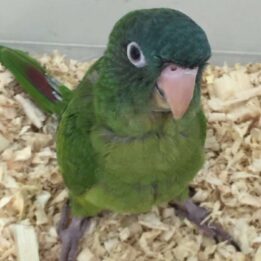 Read more
Read moreBlue Conures are brilliant and curious birds. They are playful and loving, which makes them love human interaction. Conures are magnificent companion birds when you’re unable or unsure about getting a giant companion bird.
They live 30 years, and some even older due to modern, healthier diets, exercise, and mental stimulation. Thought and consideration should go into the purchasing of a companion bird because these are lifetime companions
-
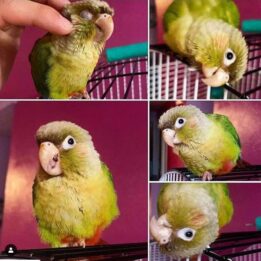 Read more
Read moreCinnamon Green Cheeks Conures are brilliant and curious birds. They are playful and loving, which makes them love human interaction.
They live 30 years, and some even older due to modern, healthier diets, exercise, and mental stimulation. Thought and consideration should go into the purchasing of a companion bird because these are lifetime companions.
Cinnamon Green Cheek Conures are bright green with light grey barring on their chest and head that fades from red and yellow to white on the stomach. They grow to be 10 inches long.
-
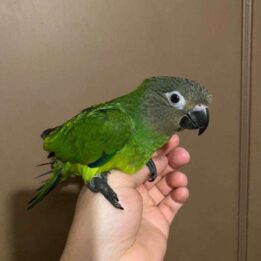 Read more
Read moreThey are being hand raised and hand tamed in my home. They will be socialized everyday. They will be weaned onto Zupreem Natural Pellets and Fresh Vegetables. They will be ready for loving forever homes in about 6 weeks. Duskys make wonderful pets, they are sweet, affectionate, love to cuddle, goofy, playful and love being with their human.
-
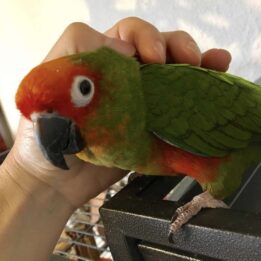 Add to cart
Add to cartGolden-Capped Conures have become popular as pets, thanks to their attractive yellow, red and green plumage, sunny personality, and lively antics. This attractive bird is less noisy than most other conures. Its name comes from the yellow crown tinge on its head. the Golden-capped Conure to have a great playful personality. Length 30 cm (12…
-
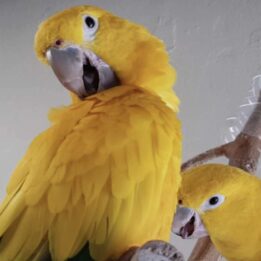 Add to cart
Add to cartGolden Conure for Sale! Golden Conures are native to South America. They are a stunning species with bright yellow plumage throughout their entire body with the exception of some deep green on their wings. Goldens make outstanding companions. A hand-fed baby that receives love and attention will stay sweet its entire life. They are a…
-
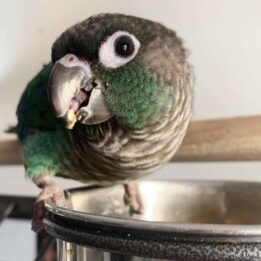 Add to cart
Add to cartGreen Cheek Conure for Sale! Green Cheek Conures are native to South America. GCCs come in a wide variety of color mutations. Green Cheeks are great family birds and are known for their loving, clownish and curious personalities. They are extremely playful and love to be out of the cage and with their human companions….
-
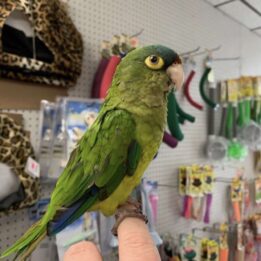 Read more
Read moreThe Half-Moon Conure is a lively, alert, spontaneous little bird. They will bob their head and even dilate their eyes when they are happy to see you, are showing off for you, or are just plain excited! Though they can be noisy the Half-Moon Conure has a lower volume to their call. They are considered…
-
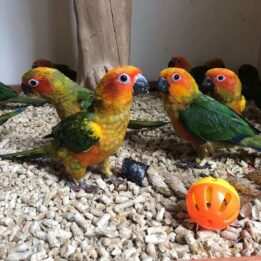 Read more
Read moreThe Jenday conure is a beautiful bird that is known for its bright and beautiful colors. The coloring rivals that of a Sun Conure, which has led to some very devoted Conure owners questioning which one is the most impressive out of the Conure family.
The back of a Jenday Conure is mainly green with bright blue and red accents. They also have glossy blue accents on their flight feathers and the tip of their tail. Their heads are a bright yellow with a colorful orange mask, and bare skin around their eyes. Their chest and stomach fade from yellow to bright orange and red. Their beaks are black, with their feet and legs being grey. They grow to be 12 inches long.
-
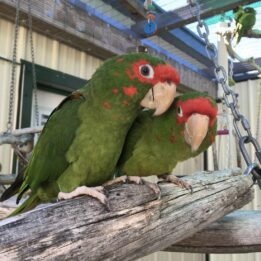 Add to cart
Add to cartMitred Conure for Sale can make affectionate family pets when given plenty of love and attention. Mitred conures are a good choice for owners who enjoy spending time interacting with a pet bird. This bird will need at least two to four hours of exercise, interaction, and social time with you per day.
-
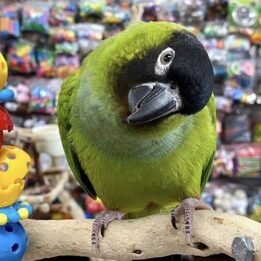 Add to cart
Add to cartThe black-hooded parakeet is a brilliant bird that is outgoing. Their size, bright colors, ability to learn tricks and talk, as well as their social skills, make them a popular attraction for bird shows. One of their best-known tricks is retrieving dollar bills from audience members then finding that same person to return the money to.
-
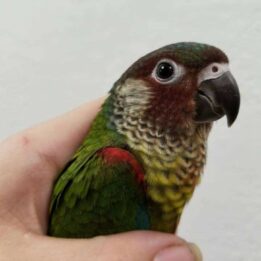 Read more
Read morePainted Conure can be a charming pet, but these birds maybe a little more nervous than the more familiar Green-cheeked Conure. Some pairs may be more difficult to breed than the better-known Pyrrhuras. Treat them with love and respect, and don’t neglect these social birds. They are more than just a beautiful flower. They are…
-
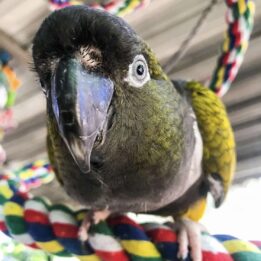 Read more
Read moreThe Patagonian Conure is a very large conure with the Greater Patagonian Conure being even larger still, about 2 inches longer. The head, neck, and upper back are olive-brown with some tinges of green, while the Lower back, rump, upper tail, and underparts are more yellowish with an olive tinge. The thighs and the center…
-
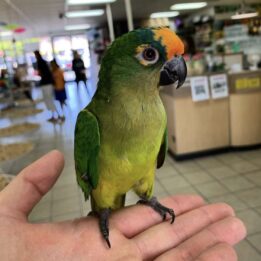 Add to cart
Add to cartWith their lovely, cute looks, and lively personality, the Peach Fronted conure is a loved breed of pet parrots. They are also one of the smaller conures, and their beauty has charmed many owners around the world. They are not as widespread as some other closely related breeds, but they are nonetheless a great companion parrot, thanks to their great traits and friendly, energetic nature. That’s why they are considered as one of the best representatives of the conure family of parrots.
-
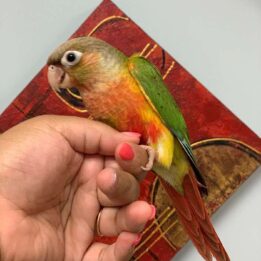 Read more
Read moreThe Pineapple Green-cheeked Conure is a favorite among bird novices because of its relatively low price, small stature, temperament, and relatively low noise level, at least compared to its larger cousins. Pineapple Green cheeked conures make excellent pets; They are little clowns, always full of energy. These birds love to hang upside-down their cage, always…
-
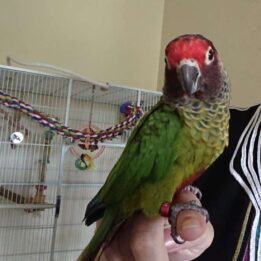 Add to cart
Add to cartRoseifrons Conure for Sale! Roseifrons are stunning birds. They are extremely colorful and have wonderful personalities. They are similar in size to other Pyrrhura species (similar in size to a Green Cheek Conure). They are playful, outgoing, and social. This is a species that is well-suited for all levels of bird experience, beginner to expert!…
-
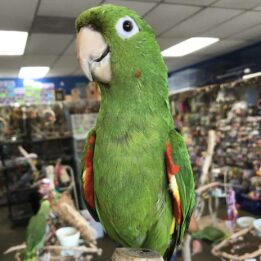 Read more
Read moreWhite Eyed Conure for Sale the white-eyed conure or white-eyed parakeet is a small green parrot that is among one of the better-behaved of pet species. It’s less noisy than many other parrots, non-destructive, and more likely to want to talk than to scream. Correctly socialized white-eyed conures can make loving and entertaining pets. White-eyed…

